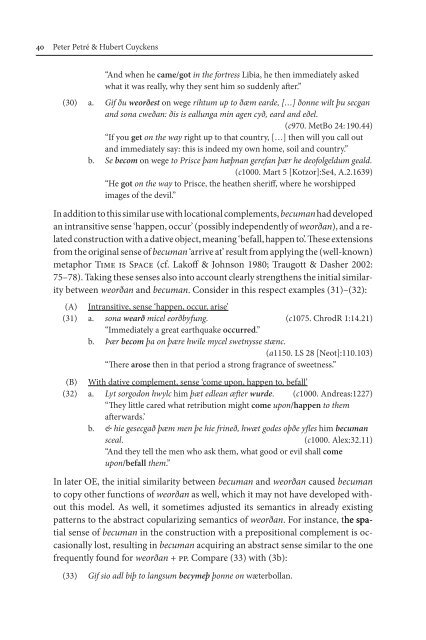Selected Papers from the Fourteenth International ... - STIBA Malang
Selected Papers from the Fourteenth International ... - STIBA Malang
Selected Papers from the Fourteenth International ... - STIBA Malang
Create successful ePaper yourself
Turn your PDF publications into a flip-book with our unique Google optimized e-Paper software.
40 Peter Petré & Hubert Cuyckens<br />
“And when he came/got in <strong>the</strong> fortress Libia, he <strong>the</strong>n immediately asked<br />
what it was really, why <strong>the</strong>y sent him so suddenly after.”<br />
(30) a. Gif ðu weorðest on wege rihtum up to ðæm earde, […] ðonne wilt þu secgan<br />
and sona cweðan: ðis is eallunga min agen cyð, eard and eðel.<br />
(c970. MetBo 24: 90.44)<br />
“If you get on <strong>the</strong> way right up to that country, […] <strong>the</strong>n will you call out<br />
and immediately say: this is indeed my own home, soil and country.”<br />
b. Se becom on wege to Prisce þam hæþnan gerefan þær he deofolgeldum geald.<br />
(c 000. Mart 5 [Kotzor]:Se4, A.2. 639)<br />
“He got on <strong>the</strong> way to Prisce, <strong>the</strong> hea<strong>the</strong>n sheriff, where he worshipped<br />
images of <strong>the</strong> devil.”<br />
In addition to this similar use with locational complements, becuman had developed<br />
an intransitive sense ‘happen, occur’ (possibly independently of weorðan), and a related<br />
construction with a dative object, meaning ‘befall, happen to’. These extensions<br />
<strong>from</strong> <strong>the</strong> original sense of becuman ‘arrive at’ result <strong>from</strong> applying <strong>the</strong> (well-known)<br />
metaphor Time is Space (cf. Lakoff & Johnson 980; Traugott & Dasher 2002:<br />
75–78). Taking <strong>the</strong>se senses also into account clearly streng<strong>the</strong>ns <strong>the</strong> initial similarity<br />
between weorðan and becuman. Consider in this respect examples (3 )–(32):<br />
(A) Intransitive, sense ‘happen, occur, arise’<br />
(3 ) a. sona wearð micel eorðbyfung. (c 075. ChrodR : 4.2 )<br />
“Immediately a great earthquake occurred.”<br />
b. Þær becom þa on þære hwile mycel swetnysse stænc.<br />
(a 50. LS 28 [Neot]: 0. 03)<br />
“There arose <strong>the</strong>n in that period a strong fragrance of sweetness.”<br />
(B) With dative complement, sense ‘come upon, happen to, befall’<br />
(32) a. Lyt sorgodon hwylc him þæt edlean æfter wurde. (c 000. Andreas: 227)<br />
“They little cared what retribution might come upon/happen to <strong>the</strong>m<br />
afterwards.’<br />
b. & hie gesecgað þæm men þe hie frineð, hwæt godes oþðe yfles him becuman<br />
sceal. (c 000. Alex:32. )<br />
“And <strong>the</strong>y tell <strong>the</strong> men who ask <strong>the</strong>m, what good or evil shall come<br />
upon/befall <strong>the</strong>m.”<br />
In later OE, <strong>the</strong> initial similarity between becuman and weorðan caused becuman<br />
to copy o<strong>the</strong>r functions of weorðan as well, which it may not have developed without<br />
this model. As well, it sometimes adjusted its semantics in already existing<br />
patterns to <strong>the</strong> abstract copularizing semantics of weorðan. For instance, <strong>the</strong> hespatial sense of becuman in <strong>the</strong> construction with a prepositional complement is occasionally<br />
lost, resulting in becuman acquiring an abstract sense similar to <strong>the</strong> one<br />
frequently found for weorðan + pp. Compare (33) with (3b):<br />
(33) Gif sio adl biþ to langsum becymeþ þonne on wæterbollan.










